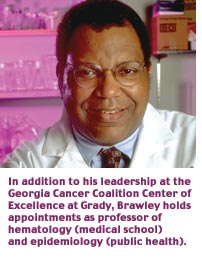The pattern
is clear. Since the early 1980s, African-Americans have been dying of
breast, prostate, and other cancers in greater numbers than Caucasians.
In 1980, black and white women with breast cancer faced similar death
rates. By 1990, a black woman’s risk of dying of breast cancer was
16% greater than a white woman’s. And by 1995, that percentage difference
had grown to a staggering 29%.
 Yet
race is not a factor—at least in terms of genetics, says Otis
Brawley, (left) recently recruited to Emory’s Winship Cancer
Institute as associate director for cancer detection, control, and intervention
and professor of hematology and oncology. “The genetics of black
folks didn’t change in the past 25 years,” he says. “I
believe a big part of the reason these disparities exist is in the quality
of care received.”
Yet
race is not a factor—at least in terms of genetics, says Otis
Brawley, (left) recently recruited to Emory’s Winship Cancer
Institute as associate director for cancer detection, control, and intervention
and professor of hematology and oncology. “The genetics of black
folks didn’t change in the past 25 years,” he says. “I
believe a big part of the reason these disparities exist is in the quality
of care received.”
Brawley
cites studies conducted by large health care systems, the Department of
Defense, and health maintenance organizations, showing that equal care
yields equal treatment among equal patients. Race, he argues, may mask
the real culprits—poverty, diet, tobacco and alcohol use, and inadequate
health care.
Brawley,
one of the nation’s foremost leaders in cancer prevention and a preeminent
researcher of health disparities, will lead Emory’s physician effort
at the Center of Excellence at Grady Memorial Hospital, recently inaugurated
by the Georgia Cancer Coalition (GCC). The coalition is a public-private
partnership that brings together Georgia’s leading hospitals and
universities, biotech firms, civic groups, and nonprofit and government
agencies. The center at Grady is the first of three to be established
by the GCC in the state.
The GCC “may
be the largest and most well thought out” use of tobacco settlement
money in the country, says Brawley. “Unfortunately, a number of states
are using the tobacco money to fill potholes and build highways. Here,
in addition to improving health, there is a public-private aspect to the
plan with a goal of luring more pharmaceutical and biotech companies that,
in turn, will employ more people. The money is being leveraged in a way
to get the biggest bang from the buck in terms of the number of people
who will benefit.”
An internist
and oncologist trained at the University of Chicago, Case Western, and
the National Cancer Institute, Brawley was recruited from the NCI, where
he was assistant director for special populations research. He was one
of the architects of the Prostate Cancer Prevention Trial, which to date
has enrolled more than 18,000 men in some 200 sites around the United
States to study the epidemiology of prostate cancer and the efficacy of
screening.
Brawley sees
both great needs and resources in Atlanta. Health disparities are tremendous
here, with breast cancer death rates among black women among the highest
in the country. The opportunity to work with a primarily African-American
population at Grady and to build a center of excellence to serve them
was a challenge he welcomed.
The first step in creating a comprehensive screening, evaluation, and treatment center at Grady will focus on a state-of-the-art facility. Renovation of the ninth and tenth floors of Grady will provide treatment and operating rooms, clinics, and areas for education. The center should be fully operational by late 2002. (BACK TO TOP)
Copyright © Emory
University, 2004. All Rights Reserved